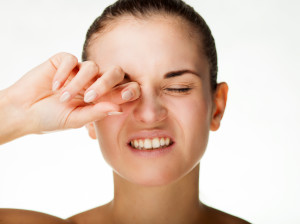 We’ve all experienced eyelid twitches. The scenario: you have a twitch in your eyelid and it just won’t stop. It feels like everyone can see it, which is embarrassing and uncomfortable. How did you get it? When will it stop?
We’ve all experienced eyelid twitches. The scenario: you have a twitch in your eyelid and it just won’t stop. It feels like everyone can see it, which is embarrassing and uncomfortable. How did you get it? When will it stop?
The little flutters that you feel in the upper or lower lid of your eye from time to time is called blepharospasm. It is an uncontrollable spasm that can last for weeks. This spasm is your body’s way of telling you that your body is out of balance. It is normally not a harmful condition. Here are a few reasons why blepharospasms occur:
- Stress can cause many physical ailments in the body. If you are going through a stressful time in your life, your body can react with eyelid flutters.
- Alcohol and Caffeine. Eyelid twitches can be an indicator that you are drinking too much caffeine or alcohol. Reducing your daily intake can help alleviate and prevent these annoying flutters.
- Eye Strain. This is the result of your eyes having to work hard to focus, especially over a long period of time. Eye strain can be a contributor to the condition if you spend a lot of time on your computer, smart phone, or tablet. Purchasing specific eyeglasses that help relieve the glare of the computer screen can help in not only alleviating eye strain and flutters, but will help in the long term health of your eyes.
- Dry Eyes. If your eyes don’t have the moisture it needs, flutters can be the result. Ageing, wearing contacts, and certain medications can contribute to the condition. Moisturizing eye drops can help and are found over the counter at your local store.
- Fatigue. Not getting enough sleep can affect your overall health and also contribute to spasms
- Irritation of the Cornea
- Allergies. Allergens can irritate your eyes, causing you to rub them. This rubbing can result in histamines being released in your body, thus resulting in the irritating eyelid twitch. Taking an antihistamine can help alleviate the problem.
. You should see an eye doctor if any of the following occurs:
- Twitching that continues more than a week
- Twitching that results in an eye closing
- Surrounding facial muscle twitches
- Swelling or redness of the involved eye
There are very rare circumstances when eyelid twitching is caused by nerve disorders such as Tourette’s syndrome, Bell’s palsy and Parkinson’s disease. Most eyelid twitching is painless and harmless and will go away on its own.
For more information about eye health and blepharospasm, search for an optometrist at IPALC.org
Share on Facebook



 Southwest Florida Medicine.com is dedicated to bringing you the very best health information available today!
Subscribe or check back regularly!
Southwest Florida Medicine.com is dedicated to bringing you the very best health information available today!
Subscribe or check back regularly!